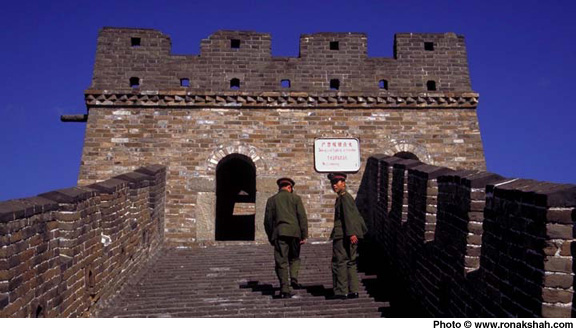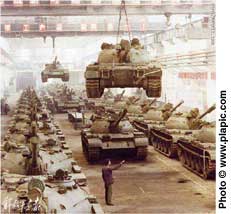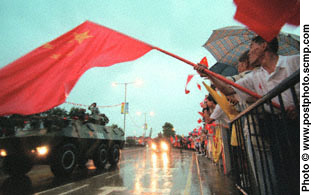
OLIVER CHOU
South China Morning Post
Wednesday, March 27, 2002
The latest round of reshuffles in the People's Liberation Army (PLA) is being viewed as part of the jockeying for power in the lead-up to China's leadership transition.
The changes in headquarters and regional commands are more than just a rejuvenation exercise or routine rotation of leading generals. They are part of manoeuvring ahead of the 16th Communist Party Congress scheduled for this autumn, at which top military appointments will be made and party and PLA leaders elected for the next five years.

Both top generals Zhang Wannian and Chi Haotian, aged 74 and 73 respectively, are expected to retire after having served as the Central Military Commission's vice-chairmen since 1995. The commission is the highest policy-setting body for the military and links the party and the PLA together.
Chief of the General Staff General Fu Quanyou and armament chief General Cao Gangchuan - who is in charge of military equipment as well as science and technology programmes - are believed to be the most promising candidates to succeed the retiring generals and steer the 2.5 million-strong army.
General Zhu, 59, served as army commander in China's southwestern provinces of Yunnan and Guizhou in the 1980s under the jurisdiction of the greater Chengdu regional command headed by General Fu.
General Fu was a well-known trouble-shooter for his leading role in quelling the Tibet unrest in the late 1980s and in Xinjiang during the early 1990s. His

General Fu was hailed nationally in 1984 for leading the First Army Corps to recover a significant border stronghold, Zheyin Mountain, which had earlier been occupied by Vietnam, a victory which scored him the top post in the Chengdu command a year later.
The recent emphasis on vigilance against terrorists, especially in the vast Xinjiang region of western China where Muslims are seeking a separate East Turkestan, has further enhanced General Fu's stature, as he has experience in dealing with minorities.
In 1990-1992, General Fu was commander of the Lanzhou command as the Soviet Union was disintegrating on its doorstep. The command was in charge of Xinjiang, with its plethora of minority groups, as well as northwestern China bordering Russia, Pakistan, Afghanistan and other smaller Central Asian states.
Also rising with General Fu is his deputy at the General Staff Department, General Guo Boxiong, who was commander of the 47th Corps, part of the Lanzhou command under General Fu in the early 1990s.
In 1999, at the age of 60, General Guo was appointed executive deputy chief the general staff and a Central Military Commission member, a move many analysts saw as a party decision to groom him to become the next PLA chief of staff.
There are plenty of General Fu's proteges from his time as Lanzhou commander now serving in PLA headquarters.
A similar trend is evident in the General Armament Department run by Cao Gangchuan, another hot candidate for vice-chairman of the Central Military Commission.
One of the four new deputy armament directors appointed there, Zhang Shiming, came directly from the Nanjing Military Region, which is the key regional command responsible for Taiwan.
A series of recent transfers of generals between headquarters and the regional commands seems aimed at boosting operational co-ordination between the centre and the regions and enhancing the field experience of senior officers.
A significant feature in this round of leadership reshuffling was the creation of concurrent positions, apparently to strengthen control of the regional commands over trouble spots.
The most notable change was the Tibet Military District, whose commander has been assigned a concurrent position as deputy commander of the parent Chengdu Military Region.
The change makes the top PLA officer in Tibet, Major-General Meng Jinxi, a member of the Chengdu command for all decision-making processes, including troop mobilisation and other military matters.
Another significant leadership appointment in the Chengdu command was the promotion of Major-General Gui Quanzhi to Chief Of Staff.
General Gui commanded Chengdu troops to enforce martial law in the Tibetan capital, Lhasa, in March 1989, when Tibetan Buddhists took to the streets seeking more autonomy on the 30th anniversary of a failed uprising, a move that triggered international concern.
At that time Vice-President Hu Jintao was party leader in Tibet and General Fu was commanding the Chengdu military region which enforced the crackdown, indicating they have a long working relationship.
Gui's promotion to Chief Of Staff of the regional command suggests even stricter military control will be applied in Tibet, further reinforced by the granting of a concurrent position in the regional headquarters to Tibet commanders.
The objective appears to be ensuring full control over potential flashpoints and rewarding PLA officers serving in a difficult location.
Oliver Chou is a Hong Kong- based China analyst (chouoliver@yahoo.com).
Articles About Tibet
Music
Novels